Plast Craft Games: Neue Gebäude
Plast Craft Games veröffentlicht eine Reihe neuer Kits aus ColorED Fukei-Reihe – diesmal rund um ein Fischerdorf bzw. einen asiatischen Hafen.
Nōmin House – 17,95 EUR
“Away from castles, these small houses made of wood and mud belonged to the most respected peasants: the farmers (Nōmin). These farmers used to rent the land of the Daimyô in order to work the land in exchange for money and protection.
Houses did not match up to the amount of respect given to farmers due to the minimalistic lifestyle reflected in their housing.“
– Housing of Feudal Japan.
Materials:
PVC foam, HDF.
Size:
Width: 12.1cm / 4.8in
Height: 9.4m / 3.7in
Lenght: 14.6cm / 5.9inThis terrain piece is designed for Kensei but can be used in any other 28mm scale game. Combined with the other elements these can represent a common fishers and farmers small village.
Shed & Latrine – 12,95 EUR
„Everyday element, latrines used to be built separately from the main house to have privacy and prevent odors from septic tanks.
On the other hand, the sheds served as resting areas when they were built in the gardens of the Daimyo mansions, and as work areas near the ports and piers. There, the fishermen sat down to fix their nets after a long day of work.“
– Housing of Feudal Japan.
Materials:
PVC foam, HDF.
Size:
Shed:
Width: 7.2cm / 2.8in
Height: 7.5cm / 2.9in
Length: 8.6cm / 3.4inLatrine:
Width: 5.2cm / 2.1in
Height: 5.9cm / 2.3in
Length: 3.9cm / 2.8in
Ashigaru House – 9,95 EUR
“Away from castles, these small houses made of straw and mud belonged to the most respected peasants: the farmers (Nōmin). These farmers used to rent the land of the Daimyô in order to work the land in exchange for money and protection.
Sometimes these houses were occupied by the Ashigaru who became the backbone of all Daimyô armies in the 16th Century, especially after the widespread adoption of the matchlock. Until the 1590’s, an ashigaru was normally a peasant who worked in his home village when not on his lord’s campaigns.“
– Housing of Feudal Japan.
Materials:
PVC foam, HDF.
Size:
Width: 8.6cm / 3.3in
Height: 6.8cm / 2.7in
Length: 11.0cm / 4.3in
Fishing Pier – 19,95 EUR
„One of Japan’s main food sources in the Edo period was fishing along with the crops. Being an island, it was rare not to find small piers or fishing ports in the small villas located on the coast. These small piers were occupied mostly by small boats, or Oshiokuri-bune, the name these received.
For the usual tasks of fishing in this type of ships were only four fishermen, the fact that on board were eight oarsmen gives us an idea of the need to gain speed to quickly reach the market in Edo (Tokyo) where the rich merchants paid for these first and coveted spring tuna equivalent to half the salary of a normal person. „
Materials:
PVC foam, HDF.
Size:
Cabin:
Width: 7.2cm / 2.8in
Height: 8.5cm / 3.4in
Lenght: 8.6cm / 3.4inMain pier:
Width: 13.2cm / 5.2in
Height: 3.5cm / 1.4in
Lenght: 22.0cm / 8.7inSecondary pier:
Width: 5.5cm / 2.2in
Height: 2.5cm / 1.0in
Lenght: 14.6cm / 5.7in
Sekibune – 25,95 EUR
“-Sekibune was a type of warship with oars used in the Sengoku and Edo periods. They were long and narrow, with a pointed prow that allowed him to move quickly, cutting the waves. The superstructure was made in yagura style, with 40 80 oars, and the hull in one or two levels, which made it a boat of two or three floors in total.“
– The samurai archives.
Materials:
PVC foam, HDF, Foamy.
Size:
Width: 12.5cm / 4.9in
Height: 16.6cm / 6.5in
Lenght: 30.1cm / 11.9in
Oshiokuri-bune – 13,95 EUR
“Small ships with open roof usually found in japanese medieval navies.These were meant to be boarding ships, but when not used for battle Oshiokuri-buneships were employed by the fishermen given its structure with the front part open that let retrieve their fishing nets easily.“
– The samurai archives.
Materials:
PVC foam, HDF.
Size:
Width: 11.1cm / 4.4in
Height: 14.7cm / 5.8in
Lenght: 20.9cm / 8.2in
Fishers & Peasants Village – 100,70 EUR
Je eines der oben gezeigten Sets.
Link: Plast Craft Games



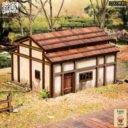
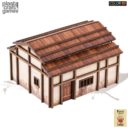
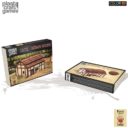
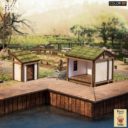
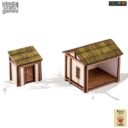
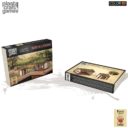
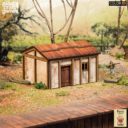
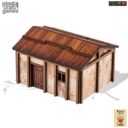
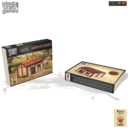
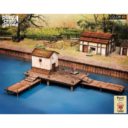
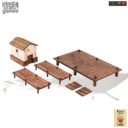
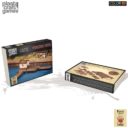
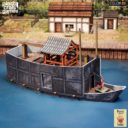
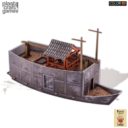
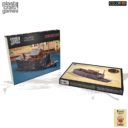
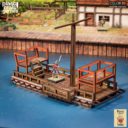
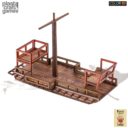
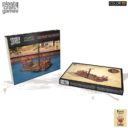
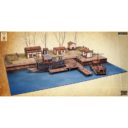
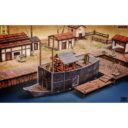
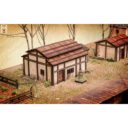
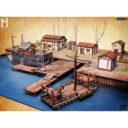
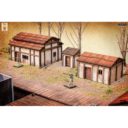
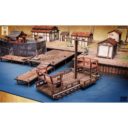

Die Schiffe sind ganz gelungen. Vielleicht wird mein Fluss doch etwas breiter ausfallen.
Schöne Ergänzung zu den Waku von Kensei.
Ich musste mich über die Sekibune gerade erst mal etwas belesen, ich war doch sehr verwunder über ein Schiff mit Metallpanzerung in der Zeitperiode.
Daher glaube ich, dass die Farbe „ungünstig“ gewählt ist, da die Dinger doch komplett aus Holz waren und manchmal mit Ziegeln bedeckt. Vor allem in der angegebenen Sengoku Periode.